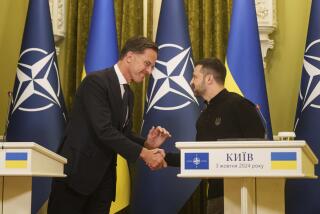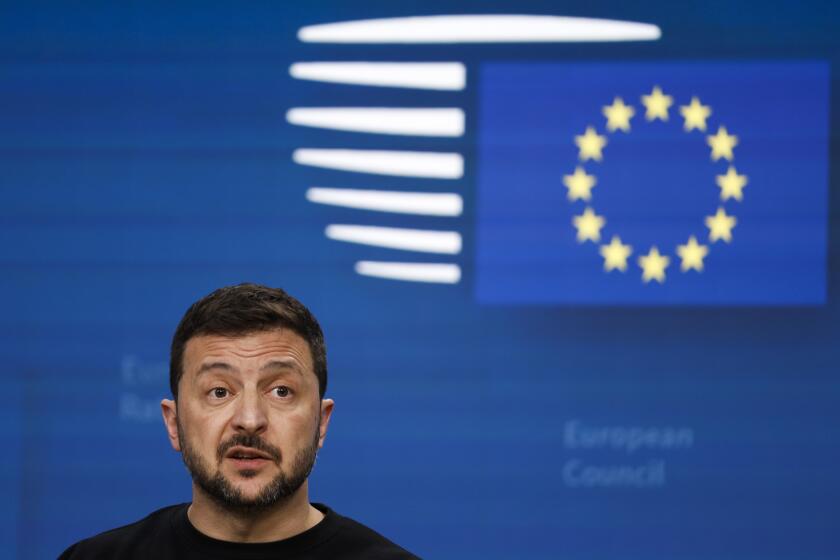Russia blames NATO for Ukraine abandoning nonaligned status
Top Russian security officials Wednesday accused NATO of pressuring Ukraine to drop its post-Soviet nonaligned status and warned that Moscow’s relations with the Western alliance would be damaged beyond repair if it extends membership to the longtime Kremlin ally.
Russian President Vladimir Putin has made clear with his seizure of Ukraine’s Crimea region and his support for separatist rebels in eastern Ukraine that he regards Kiev’s political turn toward the European Union and NATO as a threat to Russia’s regional security.
Lawmakers in Kiev on Tuesday voted to end Ukraine’s nonaligned status, a posture the westernmost former Soviet republic adopted in 2010, almost two decades after the communist federation’s breakup in 1991. At that time Ukraine was seeking to calm fears in Moscow that the geographically strategic republic where Russia’s Black Sea fleet is based wouldn’t drift into the West’s sphere of influence.
Ukraine’s Supreme Council voted overwhelmingly Tuesday to drop the nonaligned commitment as an initial step toward eventual membership in NATO. The 28-nation defense bloc already includes the three former Soviet Baltic republics of Latvia, Lithuania and Estonia, as well as all Eastern European states once tethered to Moscow under the Warsaw Pact military alliance.
NATO membership for Ukraine is years away at best, as the country must first conduct sweeping reforms of its armed forces to meet alliance “interoperability” requirements, as well as resolve the armed conflict that broke out in eastern Ukraine after Russia annexed Crimea in March. Ukrainian President Petro Poroshenko has said his economically constrained country cannot reasonably expect to be in shape for NATO accession before 2020.
Still, Russian officials have reacted angrily to the renunciation of nonalignment and warned of dire consequences should Ukraine join NATO.
“Under the slogan of Russian threat, NATO is building its military potential in the Baltic states, Poland, Bulgaria and Romania,” Deputy Defense Minister Anatoly Antonov told news agencies in Russia.
If Ukraine joins NATO, “we will have a complete collapse with NATO, which will be practically impossible to rebuild,” Antonov said, according to the Sputnik news site.
“NATO countries prompted Ukraine to take a counterproductive decision while trying to turn Ukraine into a forward line of confrontation with Russia,” Antonov was quoted as saying by the Tass news agency.
Russia Foreign Minister Sergei Lavrov also lashed out at Ukraine and NATO over the nonaligned status change, calling it “counterproductive as it only enhances the confrontation by creating an illusion that the adoption of such laws can resolve the deep internal state crisis in Ukraine.”
The Kiev leadership would be better served by negotiating directly with the separatists who have declared independent republics in the eastern Ukrainian territory they occupy, Lavrov said. He blamed the deadly conflict on the popular uprising late last year that deposed former Ukrainian President Viktor Yanukovich, a pliable Kremlin ally.
Lavrov described the separatists as victims of a coup d’etat by pro-European demonstrators and said only dialogue between Kiev and the new eastern leaders would bring peace.
Poroshenko and the newly elected parliamentary and government leaders have been reluctant to meet directly with the separatists for fear of bestowing legitimacy on their territorial claims and precipitating a breakup of the country deeply divided between the Russian-allied eastern regions and pro-European western Ukraine.
Negotiations under the guidance of the Organization for Security and Cooperation in Europe resumed Wednesday in the Belarus capital of Minsk in hopes of shoring up a Sept. 5 cease-fire between the Ukrainian government and the separatists.
The nearly 4-month-old truce has been routinely violated by both sides and little has been done to carry out the agreed-upon redeployment of fighters and armor along the still-volatile front lines. More than 1,000 have died during the purported period of disengagement, bringing the death toll to at least 4,700 since the conflict flared in April.
Expectations of a breakthrough at the Minsk talks were low, and reports that they had broken up even before their scheduled session on Friday appeared to underscore the irreconcilable positions of the sides.
Meanwhile, rolling blackouts were reported in Crimea on Wednesday, which the Tass news agency blamed on power cuts from mainland Ukraine. Ukrainian utilities supply the peninsula that is home to 2 million people with most of its electricity, as the region has been integrated into Ukraine’s economy and infrastructure since 1954.
Power supplies were cut off to the entire peninsula for nearly four hours in the afternoon Wednesday, which Crimean government chief Sergei Aksyonov blamed on “enemy sabotage.”
Follow @cjwilliamslat for the latest international news 24/7
More to Read
Sign up for Essential California
The most important California stories and recommendations in your inbox every morning.
You may occasionally receive promotional content from the Los Angeles Times.











